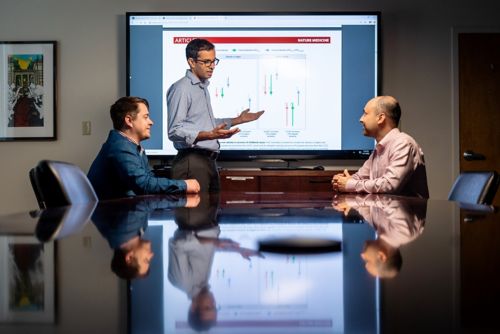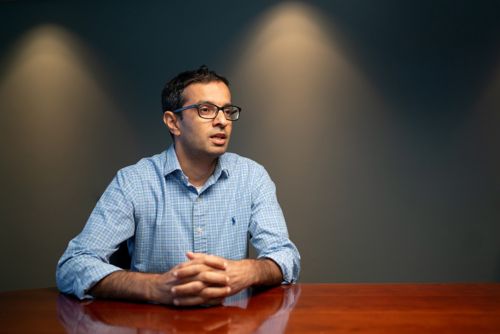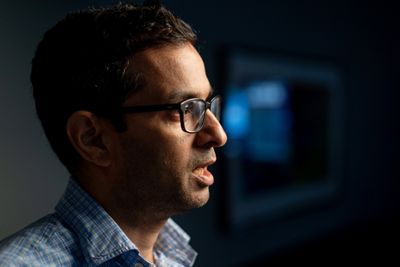St. Jude Family of Websites
Explore our cutting edge research, world-class patient care, career opportunities and more.
St. Jude Children's Research Hospital Home

- Fundraising
St. Jude Family of Websites
Explore our cutting edge research, world-class patient care, career opportunities and more.
St. Jude Children's Research Hospital Home

- Fundraising
Yadav Sapkota, PhD
Striving to develop prediction models that assess the risk of developing toxicities based on patients’ characteristics, cancer treatments, and genetic profiles.
Overview
Cancer therapies, while imperative to treat oncologic disease, pose the potential for long-term toxic effects in patients and survivors of childhood cancer. Understanding the long-term toxicity from cancer treatments is a cornerstone of assessing outcomes in survivors of childhood cancer. Using big-data analytical approaches, we aim to understand factors that lead to long-term toxicities. Our work strives to develop prediction models that assess the risk of developing toxicities based on patients’ characteristics, cancer treatments, and genetic profiles.

Sapkota Research Summary
As part of the Department of Epidemiology and Cancer Control, we use a variety of big-data analytical approaches and platforms—including whole-genome sequencing, whole-exome sequencing, RNA-sequencing, proteomics, and metabolomics—to hone in on the mechanisms that underlie long-term toxicities from cancer treatments. We functionally assess that information using patient-specific human induced pluripotent stem cell (hiPSC)-derived cells to understand the underlying molecular mechanisms in a tissue-specific manner. In addition, we also use patient-specific hiPSC cells for in vitro modeling of late effects and identification of genetic variants modulating the molecular response to cancer therapies. With these functionally relevant genetic variants, clinicians can help explore possible treatment alternatives to improve long-term health outcomes in a genotype-specific manner.
Our prediction model research intends to understand the effects of multiple genetic variants on outcomes, known as polygenic risk prediction. This approach involves mining the effects of multiple variants in a single value, or score, that represents the genetic risk for a given individual. We have developed risk prediction models that include the polygenic score with respect to hypertension, coronary artery disease, and morbid obesity in childhood cancer survivors. Our goal is to offer insights into an individual’s risk for a particular health outcome. With this insight, we can empower clinicians to modify or minimize a patient’s exposure to cancer treatments that have a high correlation with late effects.

Our mechanistic research identifies genetic variants associated with risk of late effects in survivors, including those whose risk associations differ by ancestry. Without studies in non-European (minority) populations, the optimal goal of personalized genomic medicine and clinical care for all patients will not be a reality. We identified genetic variants conferring risk of various late effects in childhood cancer survivors in an ancestry-specific manner. For example, we detected two new genetic variants associated with late cardiotoxicity—one implicated in childhood cancer survivors of European descent and another implicated in survivors of African descent. Our work strives to understand the underlying mechanisms of these genetic variants by using patient-specific hiPSC-derived cardiomyocytes from childhood cancer survivors participating in the St. Jude LIFE cohort. For both variants, we perform functional genomic assays and expose the hiPSC-derived cardiomyocytes to specific chemotherapy treatments and determine the underlying mechanisms.
In addition to modeling the chemotherapy-induced cardiotoxicity using patient-specific hiPSCs, our work also studies cisplatin—a commonly used chemotherapy drug that often leads to toxicities and health outcomes such as hearing loss—and neurotoxicity caused by the drug methotrexate. In the future, we hope to further expand this research to include the mechanisms underlying radiation-induced cardiotoxicities and other treatment-related toxicities.
All our work seeks to increase understanding as to how cancer treatments can pose risks to outcomes and the development of long-term effects. With this knowledge, our goal is to aid clinicians develop more effective and individualized treatment plans that improve long-term outcomes for patients of childhood cancer.
Selected Publications
About Yadav Sapkota
Dr. Yadav Sapkota is an Assistant Member in the Department of Epidemiology and Cancer Control. Dr. Sapkota leads research efforts that assess the long-term toxicities of cancer treatments in childhood cancer survivors. He received his PhD from the University of Alberta in Canada and lends his expertise to research interests that study topics ranging from genetic epidemiology and integrated multi-omics approaches to the genetic contributions to health disparities.

Contact us
Postal Address
Yadav Sapkota, PhD
Assistant Member
Department of Epidemiology and Cancer Control
MS 735
St. Jude Children's Research Hospital
Follow Us

Memphis, TN, 38105-3678 USA GET DIRECTIONS